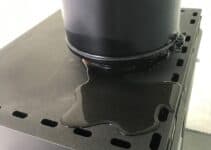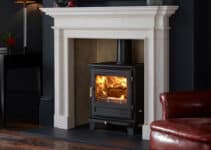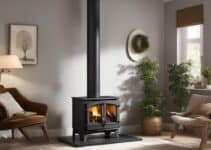Few things can beat the warmth, comfort, and traditional glow of a log burner on a winter’s evening. But if you’re considering introducing an authentic wood stove set-up into your home, you might be wondering whether it’s going to prove a noisy addition to the house.
So are log burners noisy? Log burners aren’t always the quietest of evening companions. But thats not to say they’re noisy. Clicks, ticks, whispers, whistles, creaks, and knocks are all relatively common when a stove is in use, and can occur for a variety of reasons.
That being said, the vast majority of log stove owners come to see these incidental noises as being a welcome part of their stove’s ‘character’, rather than a nuisance.
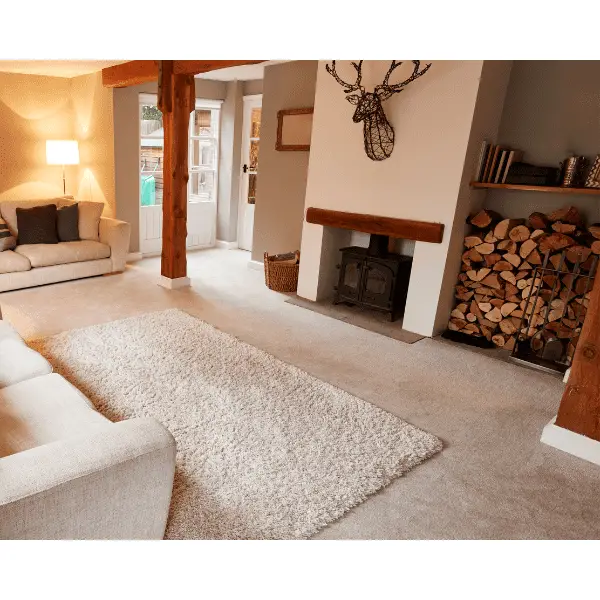
Are Wood Burners Noisy?
Wood stoves are capable of emitting various sounds before, during and after use.
There are a whole host of reasons that wood burners and stoves can produce unfamiliar or unusual noise, though the most common relate to the expansion and contraction of the stove’s metal as a result of changing temperature.
For that reason, the most common noises occur when the stove actually contains an active fire, or shortly after a fire has died down.
Whether or not a wood burner can be described as ‘noisy’ will depend largely on an owner’s own perception of what constitutes ‘too much noise’.
Generally speaking, most wood stove owners come to view any particular ticks, creaks, or knocks that their stove produces as being a welcome part of the stove’s character, and not an intrusion on their peace and quiet.
Many even come to find the particular ‘music’ of their stove to be a comforting sound.
It’s also worth remembering that plenty of other methods we use to heat or control indoor temperatures come with incidental noises. Traditional radiator systems often creak, tick, or rattle as they heat up, not to mention the sounds associated with boilers or water tanks.
Air conditioning units or motor driven fans can be similarly loud, until you get used to the background hum that they provide. In other words, few domestic appliances relating to indoor heating can work in complete silence!
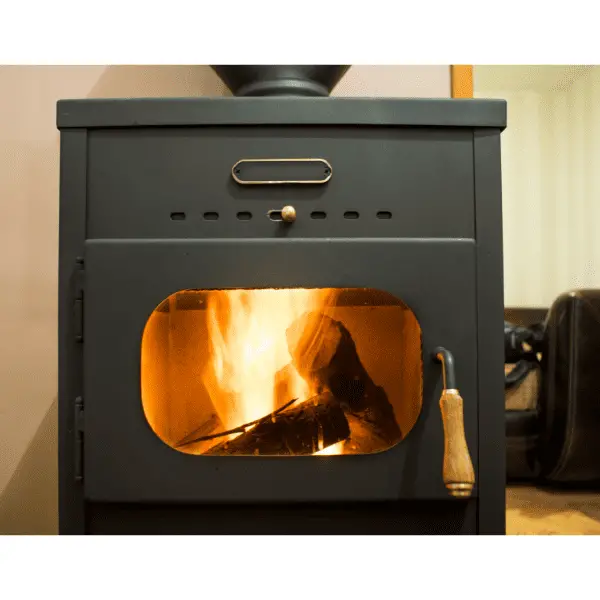
Why is My Log Burner Roaring?
A roaring noise coming from your log burner will usually be related to the air flow.
When everything is working as it should, the fire within your stove will be fed by a steady influx of air being drawn in through the vents of the stove, up through the stove pipe, and out via the chimney duct or flue.
This direction of air flow – in at the mouth of the stove and up-and-out via the exit channels – helps prevent smoke and other noxious fumes pouring back into your home.
Wood Burner Noisy Flue
If the airflow increases suddenly in your wood burner, or is particularly fierce, this can cause a roaring noise within the stove itself or further up the flue and chimney.
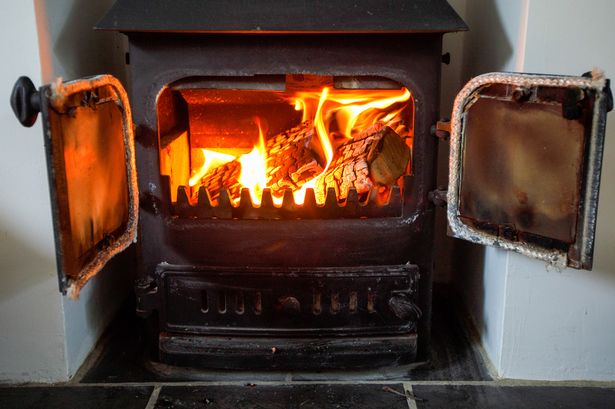
Such a rush of air will also result in your fire burning more fiercely, which in itself can cause a roaring sound. Increases in airflow can be intentional.
You might wish to open up the air flow as a way of encouraging fuel to ignite or a fire to increase in strength.
Increased airflow, and a resultant roaring sound, might also be encouraged by a large difference in the indoor temperature and outdoor temperature.
Taller chimneys can also result in faster flows and potentially louder roaring in the stove itself.
Log Burner Whistling
Wind blowing across the top of the chimney may also contribute to the pace of air being drawn up and through the stove. For that reason, a chilly and windy night coupled with a warm house indoors can provide the ideal conditions for a roaring fire.
Roaring sounds, or whistling, might also be experienced when a stove is not in active use. Chimneys and flues can sometimes ‘catch’ the wind outside, especially if they are not covered with cowls or fitted with dampeners.
Think of a chimney pipe like a huge flute. When wind blows fiercely over the roof at a certain angle and at a certain pace, the sound can reverberate down the chimney and into your home, causing your wood burner whistling sound.
Why is My Log Burner Clicking / Ticking?
Clicking, ticking, or small metallic ‘pinging’ noises are often the most common sounds of a wood stove. They can nearly always be attributed to the metal of the stove expanding or contracting due to temperature changes.
Different stoves will heat up and expand in different places and at different rates, resulting in various clicks, pings, and sometimes even bangs when a fire is first lit and the metal starts to heat up.
Log Burner Making Clicking Noise
Anecdotal reports suggest that steel stoves, rather than traditional cast iron stoves, can sometimes be more prone to this sort of noise, although any type of metal log burner can, and usually does, make some sort of clicking or ticking noise when it’s heated up.
Just as metal expands when it’s heated, so too does it contract when it grows cold again. Expect your stove to make a few creaks and clicks once a fire has been extinguished and the metal starts to cool.
Once again, this is rarely anything to worry about, often coming to be seen as just another part of the stove’s character.
Wood Burning Banging Noise
What if the sounds made by a log burner are a bit louder than just clicks and ticks?
Not all wood stoves emit banging noises or sudden, loud knocks, but some users do report this as being a regular, and occasionally alarming, feature of their log burner.
The cause of banging or knocking might sometimes be more difficult to establish, though the most usual culprit is still likely to be the expansion or contraction of metal.
Remember that stove pipes and chimney flues can also be made of stainless steel, liable to expand and contract further up the stove system.
A sudden ‘pop’ from heated steel can reverberate down a chimney and cause a loud, sudden noise that doesn’t necessarily mean there’s something you need to worry about.
Other bangs or loud pops, if they’re coming from the stove itself, could be caused by wood ‘popping’. Wet wood or fuel with plenty of sap left in it is particularly prone to this, as evaporated liquid and gases trapped within the wood can burst out during heat expansion.
Logs falling against the side of the wood stove can also cause a knocking or metallic bang.
Finally, puff backs can sometimes occur. These can result in a sudden ‘whuffing’ sound, as if a whoosh of flame has suddenly shot up the chimney.
A puff back can be caused when a blazing fire suddenly has its air supply reduced, resulting in the oxygen in the stove itself swiftly being used up.
This sudden vacuum can cause a brief reversal in the usual flow of air, causing air from the chimney to be sucked back down into the stove fire. This oxygenated air pulled in from the chimney then ignites, causing the sudden ‘whuff’ that you might hear.
Such puff backs are not usually dangerous, as they are often brief and contained within the sealed stove. Nevertheless, they can cause sudden noise and can also, with their burst of pressure, cause damage to the joints or seals on your stove.
To avoid this, try not to cut the air supply to a roaring fire suddenly, but gradually reduce the air flow when you wish to let the fire die down.
Wood Burner Making Loud Noise – A Summary
Wood burners aren’t necessarily the quietest of heating appliances. Nevertheless, for many enthusiastic wood stove owners, the merry pop, crackle, and click of their own stove is all part of the joy and comfort of having a traditional heating method within their home.
Most incidental sounds coming from the stove will be from metal expansion and contraction, or from air flow and wind noise.
If you have concerns about the safety of your stove, or think that a noise might indicate that something has broken, ensure you have it checked by a qualified professional or by the original installer for faults before using it again.
